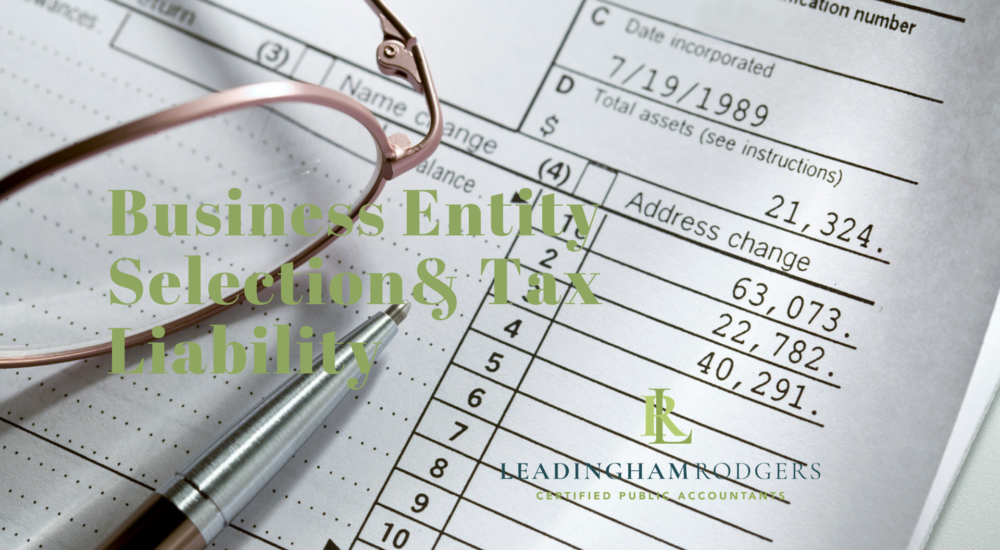Corporate philanthropy is about more than limiting your tax burden. Giving to organizations in your…

What Type of Business Are You In – Entity Selection and Tax Liability
The time has come: You’ve finally decided to start your own business. Congratulations! But there are several key decisions you’ll need to make before getting to work.
First, you’ll need to choose your business entity. Your choice of business entity can affect profit flow, tax and legal liability, legal ownership of assets, and much more. Most entity types require documentation to be filed with state and local authorities, which makes the process of choosing that much more crucial.
Different business entities can have drastically different federal tax liabilities. By choosing the correct course at the outset, you’ll be setting yourself up for success from the very start.
A CPA from Leadingham Rodgers can help you determine what type of entity is in your best interest–both as a new business owner and as a taxpayer. But what are the most common forms of business entities? What are their tax advantages and liabilities? Let’s take a look and find out.
Sole Proprietorship
A sole proprietorship is a type of enterprise owned and operated by a single person for that person’s sole benefit. A self-employed business owner, independent contractor, and franchise owner may all be examples of a sole proprietorship.
Why Choose Sole Proprietorship?
If you are the individual owner and operator of your business, and you plan on remaining that way for at least the short term, a sole proprietorship has numerous advantages. Sole proprietorships require much less paperwork and red tape. Sole proprietorships also enjoy easier access to banking services.
Tax Liability
In a sole proprietorship, the business and business owner are considered one and the same. The business owner pays taxes for their business income as an individual. Because the two are legally indistinguishable, your business taxes are your taxes just as your business profits are your profits.
Partnerships
There are two types of partnerships–general and limited. A general partnership is an agreement between two or more individuals to share cost, labor, profit, and tax/legal liability. A limited partnership is still a partnership, however the amount of cost, labor, profit, and tax/legal liability is determined separately for each partner based on their contributions or “stake” in the business.
Why Choose a Partnership?
As in many aspects of life, by sharing your business with partners you can share expertise, contacts, labor, and expenses. While you will, of course, still share any profits made, you’ll also be sharing any burdens.
Tax Liability
General partnerships are much like sole proprietorships–the business owners and the business entity are legally the same. Each partner pays taxes on business income based on their own individual incomes.
Limited partnerships are similar to general partnerships and are considered “flow-through entities.” Profits “flow through” the business in the form of distributions paid to partners.
Limited Liability Company
Unlike sole proprietorships or partnerships, a limited liability company (LLC) is a separate legal entity from its owners, operators, or shareholders.
Why Choose LLC?
One of the main advantages of choosing to start your business as an LLC is in the name itself–limited liability. Profit sharing is flexible and (depending on the circumstances) most legal liability falls squarely on the business entity rather than the owners.
Tax Liability
If you are the one and only owner of an LLC, your tax burden will be identical to that of a sole proprietorship. LLCs with more than one owner are typically taxed as partnerships. In either case, tax liability still rests with single or multiple owners, however taxation still varies from state to state and a CPA can help you navigate local burdens.
Make the Right Choice
In addition to sole proprietorships, partnerships, and LLCs, there are also S corporations, C corporations, and non-profit organizations just to name a few. Of course, federal and state taxes will work differently depending on entity type and location.
Navigating these differences can be tricky to first-time or even seasoned business owners. A CPA from Leadingham Rodgers can help you determine the best course of action for your business.
Why leave to chance something as important as business entity selection, especially when you’ve got so much on the line? A CPA can cut through the red tape and get you working toward your dream in no time.
Determine what type of business you’ll be with help from Leadingham Rodgers!
Like weddings, birthdays, and graduations, you’ll only start your new business once. A CPA from Leadingham Rodgers can help you make the most informed decision the first (and only) time around. For more information about business entity types and selection, or to better understand your potential tax burden, call (334) 270-3366 today!



